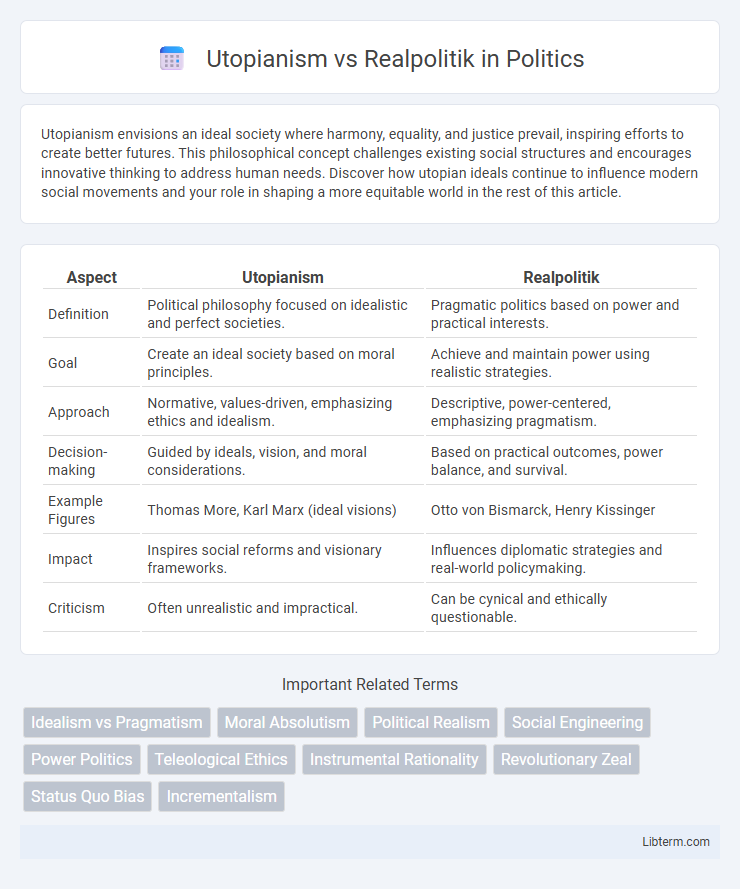Utopianism envisions an ideal society where harmony, equality, and justice prevail, inspiring efforts to create better futures. This philosophical concept challenges existing social structures and encourages innovative thinking to address human needs. Discover how utopian ideals continue to influence modern social movements and your role in shaping a more equitable world in the rest of this article.
Table of Comparison
| Aspect | Utopianism | Realpolitik |
|---|---|---|
| Definition | Political philosophy focused on idealistic and perfect societies. | Pragmatic politics based on power and practical interests. |
| Goal | Create an ideal society based on moral principles. | Achieve and maintain power using realistic strategies. |
| Approach | Normative, values-driven, emphasizing ethics and idealism. | Descriptive, power-centered, emphasizing pragmatism. |
| Decision-making | Guided by ideals, vision, and moral considerations. | Based on practical outcomes, power balance, and survival. |
| Example Figures | Thomas More, Karl Marx (ideal visions) | Otto von Bismarck, Henry Kissinger |
| Impact | Inspires social reforms and visionary frameworks. | Influences diplomatic strategies and real-world policymaking. |
| Criticism | Often unrealistic and impractical. | Can be cynical and ethically questionable. |
Defining Utopianism and Realpolitik
Utopianism envisions ideal societies based on moral perfection, emphasizing visionary goals and ethical principles without constraints from current political realities. Realpolitik prioritizes pragmatic, strategic decision-making grounded in power dynamics and practical considerations, often sidelining ethical ideals for achievable outcomes. The contrast lies in utopianism's focus on aspirational ideals versus Realpolitik's emphasis on tangible political effectiveness.
Historical Roots of Utopianism
Utopianism traces its historical roots to early philosophical works such as Plato's "Republic" and Thomas More's 1516 book "Utopia," which envisioned ideal societies based on justice, equity, and harmony. These visionary models emphasize moral and social perfection as attainable goals, often contrasting sharply with the pragmatic approach of Realpolitik, which prioritizes power, national interest, and practical governance. The Renaissance and Enlightenment periods further shaped utopian thought by promoting human reason and the possibility of societal progress through idealized reforms.
The Evolution of Realpolitik
Realpolitik evolved as a pragmatic approach to international relations, emphasizing power, national interest, and practical concerns over ideological goals or moral considerations. Originating in 19th-century European diplomacy, it contrasts sharply with Utopianism, which aspires to idealistic, often moral-driven visions of global harmony and peace. The survival and adaptation of Realpolitik in modern geopolitics highlight its focus on strategic stability and the management of power dynamics amid complex global challenges.
Key Principles: Idealism vs Pragmatism
Utopianism emphasizes idealism by advocating for visionary goals based on moral perfection and societal harmony, often prioritizing ethical ideals over practical constraints. Realpolitik centers on pragmatism, focusing on power, strategic interests, and realistic considerations to achieve feasible political outcomes. The contrast lies in Utopianism's commitment to transformative ideals versus Realpolitik's emphasis on adaptable, results-driven policies within existing power structures.
Influential Thinkers and Theorists
Utopianism, championed by thinkers like Thomas More and Karl Marx, envisions ideal societies based on moral principles and collective well-being, emphasizing transformative social justice and equality. Realpolitik, associated with figures such as Niccolo Machiavelli and Otto von Bismarck, prioritizes pragmatic power dynamics, state interests, and practical governance over ideological purity. The contrasting approaches of these theorists highlight the enduring tension between idealistic aspirations and pragmatic statecraft in political theory.
Utopianism in Political Movements
Utopianism in political movements emphasizes idealistic visions of a perfect society based on principles of equality, justice, and communal welfare, often inspiring revolutionary change and social reform. Rooted in the works of early thinkers like Thomas More and later socialists, utopianism drives collective action toward creating visionary prototypes of harmonious communities. While criticized for impracticality, utopianism fuels political ideologies that challenge existing power structures and propose transformative solutions to social and economic inequalities.
Realpolitik in Global Power Dynamics
Realpolitik dominates global power dynamics through pragmatic decision-making grounded in national interests and strategic calculations rather than ideological ideals. This approach prioritizes military strength, economic leverage, and diplomatic negotiations to maintain or shift balance of power among nations. Key examples include the U.S.-China rivalry and Russia's assertive foreign policy, reflecting Realpolitik's emphasis on power and survival over utopian aspirations.
Successes and Failures in Practice
Utopianism's successes lie in inspiring visionary social reforms and idealistic frameworks, exemplified by movements such as the abolition of slavery and early environmentalism; however, its failures often stem from impracticality and disregard for power dynamics, leading to unachieved or unstable outcomes. Realpolitik achieves tangible successes through pragmatic, power-focused diplomacy evident in the Congress of Vienna and modern statecraft, yet it frequently faces criticism for ethical compromises and short-term gains that undermine long-term peace and justice. The contrast reveals that while utopianism drives moral progress, Realpolitik secures concrete results, highlighting the need for balance between idealism and practical governance.
Modern Relevance and Applications
Utopianism envisions ideal societies based on perfect social, political, and economic structures, inspiring movements for systemic reforms in areas like environmental policy and social justice. Realpolitik prioritizes pragmatic and strategic decision-making grounded in power dynamics and practical outcomes, influencing modern diplomatic negotiations and international relations. Contemporary governance often balances utopian goals with Realpolitik tactics to achieve sustainable progress amid complex global challenges.
Balancing Utopian Vision with Realpolitik Strategies
Balancing utopian vision with realpolitik strategies requires integrating idealistic goals with pragmatic political actions that acknowledge power dynamics and constraints. Utopianism offers long-term aspirations for justice and equality, while realpolitik provides practical methods to navigate complex political landscapes and achieve incremental progress. Effective policy-making harmonizes visionary objectives with strategic compromises to foster sustainable social and political change.
Utopianism Infographic

 libterm.com
libterm.com